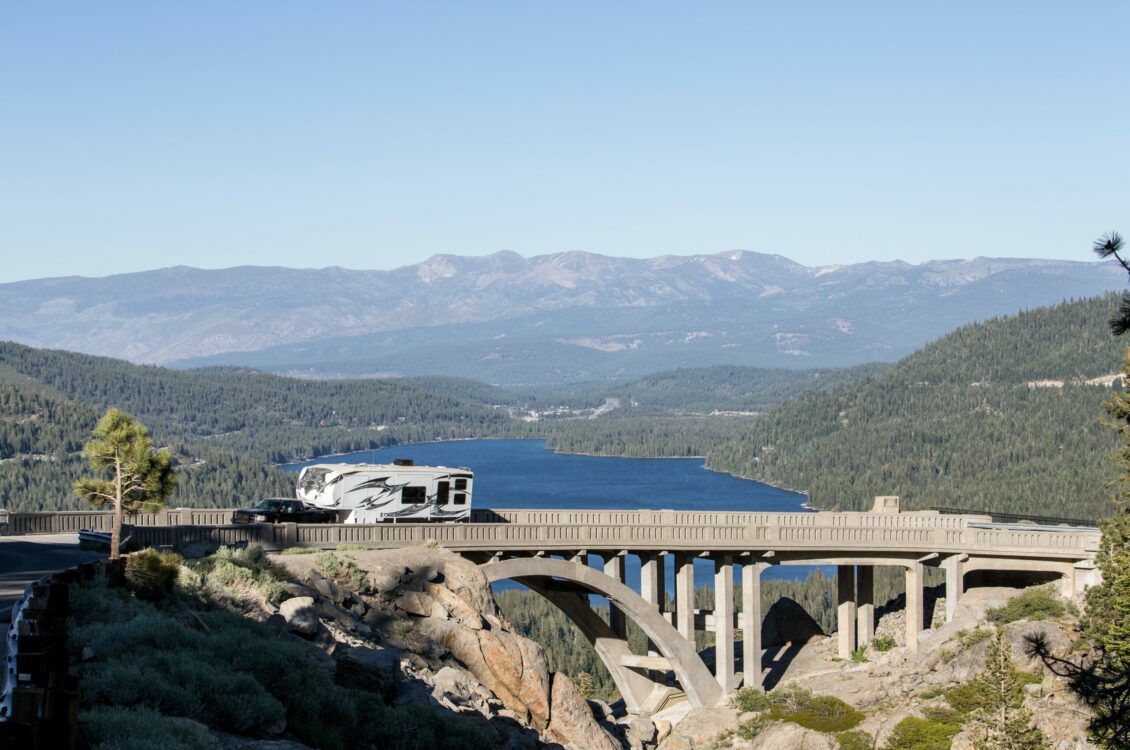
Keeping your RV in top-notch condition is more than just a routine; it’s an investment. When properly stored and cared for, the life span of your RV can significantly increase, saving you from unnecessary costs and maintaining its value over time. We’ll walk you through the top 7 tips to help keep your RV safe and secure in storage.
1. Remove food and debris from the RV interior
Leaving food items in your RV can attract pests, leading to potential damage. Plus, it can cause unpleasant odors that linger, making your RV less inviting when it’s time to hit the road again. Leaving debris in your RV can scratch surfaces and lead to mold or mildew.
To help ensure you aren’t leaving food items behind, check all rooms and inside cabinets and storage drawers and shelves, including your refrigerator and pantry. Dispose of perishable items and consider taking nonperishables into your home until your next trip. Thoroughly clean the floors, paying special attention to corners and under furniture where debris tends to accumulate. Wipe down all surfaces, including counters, tables and kitchen appliances. [1]
How to keep pests and mice out of your RV
Keeping your RV clean and food-free is a great first step in preventing pests, but additional measures can be taken to ensure that your home on wheels stays rodent-free during storage. Here are some practical steps to keep mice and other pests out of the RV:
- Seal entry points: Use steel wool or spray foam to seal any cracks or holes where rodents might enter.
- Use mouse deterrents: These can include mothballs, dryer sheets and essential oils such as peppermint.
- Store food properly: Any food left in the RV should be stored in mouse-proof containers.
- Light it up: Mice prefer dark places, so keeping your RV well-lit can deter them.
- Regular inspection: Check for droppings, chewed wires or nesting materials. [2]
2. Clean the RV exterior
Routine cleaning can prevent the accumulation of dust, mud, and other harmful substances that could lead to potentially costly repairs. This is particularly important for the roof of your RV, which should be inspected and cleaned before storing. Also, cleaning the exterior of your RV may help to protect it from the elements. Once the walls and roof are washed, apply a coat of wax to safeguard the finish from damaging ultraviolet rays. It’s recommended to use RV-specific cleaning products that are designed to be gentle on your RV’s exterior. Consider also using a long-handled brush to reach high areas, and don’t forget to clean the awnings, slide-outs and tires. [3]
3. Keep moisture out of your RV in storage
Moisture buildup in an RV is a common issue, especially when the vehicle is in storage. RVs are often exposed to varying weather conditions, which can lead to condensation, particularly in humid or cold climates. Activities inside the RV, such as cooking or showering, can produce moisture that leads to condensation. This moisture can make the RV feel cold and damp, and if left untreated, it can lead to costly repairs due to mold, rust and rot. Help keep moisture out of your RV with proper ventilation, a dehumidifier, moisture absorbents and regular checks for leaks or seepage. [4]
4. Protect your RV battery from extreme temperatures
Extreme temperatures, both hot and cold, can significantly impact the performance and life span of an RV battery. Removing the RV battery in extreme temperatures becomes an important step in prolonging your vehicle’s life. Keep your RV battery in a cool, dry place, away from heat sources and flammable materials. Regularly check the battery’s charge level. A trickle charger or a battery maintainer may help keep the battery at an optimal charge. Clean the battery terminals before storage to prevent corrosion. Also, remember to wear protective gear during the removal process, use proper lifting techniques to avoid injury and ensure that the battery is stored upright to prevent leaks. [3]
5. Cover your RV tires
Improperly stored tires can develop flat spots or deformities, especially if they bear the weight of the RV for an extended period. Also, adverse conditions such as heat, sunlight and humidity can cause the rubber to deteriorate or dry rot. Before storing your tires, you should make sure they are thoroughly cleaned and dried. Keep them out of direct sunlight in a cool, dry place to prevent the UV rays from damaging them. If possible, store your tires vertically in airtight bags to prevent dust, dirt and moisture from getting in them. [1]
6. Invest in an RV cover or covered RV storage facility
An RV cover or a covered storage space shields your vehicle from harsh weather conditions, including sun, rain, snow and wind. This helps to maintain the exterior condition of your RV, preserving its resale value. Over time, exposure to the elements can lead to rust, fading paint and damage to the roof and tires. With a cover or a covered storage option, you can prevent such damage and reduce maintenance costs. Although covered storage or an RV cover may seem like an additional expense, it can save you money in the long run. It reduces the need for frequent repairs and maintains the RV’s value, making it a cost-effective investment. [1]
7. Ensure protection with RV insurance
Unpredictable weather conditions, accidents, and theft are all potential risks that could lead to substantial financial losses. And that’s where RV insurance comes in. Speak with an independent agent today about how to help protect your RV.
Sources:
[1] “RV Storage: 12 Tips for Properly Storing your RV,” stor-it.com/blog/rv-storage-12-tips-for-properly-storing-your-rv (Accessed Dec. 2023).
[2] “Pest Prevention: How to Keep Mice Out of Your RV,” jdpower.com/rvs/shopping-guides/how-to-keep-mice-out-of-rvs (Accessed Dec. 2023).
[3] “Camping World’s Guide to RV Storage,” blog.campingworld.com/learn-to-rv/camping-worlds-guide-to-storing-an-rv (Accessed Nov. 2023).
[4] “How to Stop Condensation on RV Windows,” groverv.com/blog/how-to-stop-condensation-on-rv-windows (Accessed March 2023).
Disclaimer:
The information included here is designed for informational purposes only. It is not legal, tax, financial or any other sort of advice, nor is it a substitute for such advice. The information may not apply to your specific situation. We have tried to make sure the information is accurate, but it could be outdated or even inaccurate in parts. It is the reader’s responsibility to comply with any applicable local, state or federal regulations. Nationwide Mutual Insurance Company, its affiliates and their employees make no warranties about the information nor guarantee of results, and they assume no liability in connection with the information provided. Nationwide and the Nationwide N and Eagle are service marks of Nationwide Mutual Insurance Company. © 2024 Nationwide



